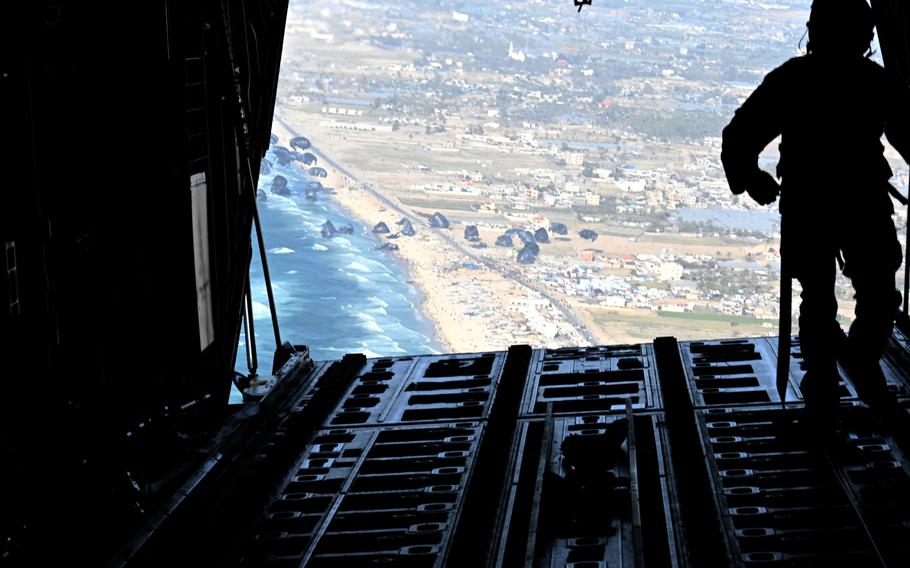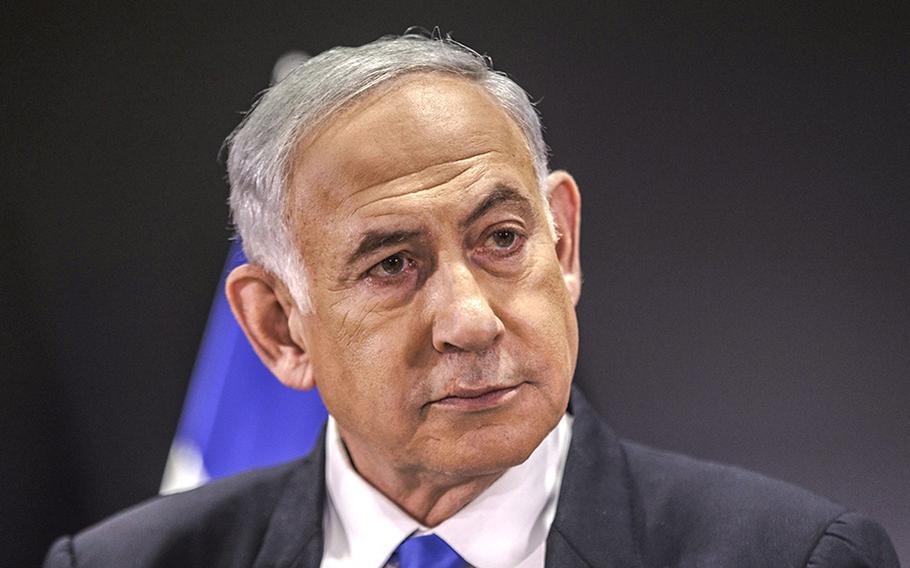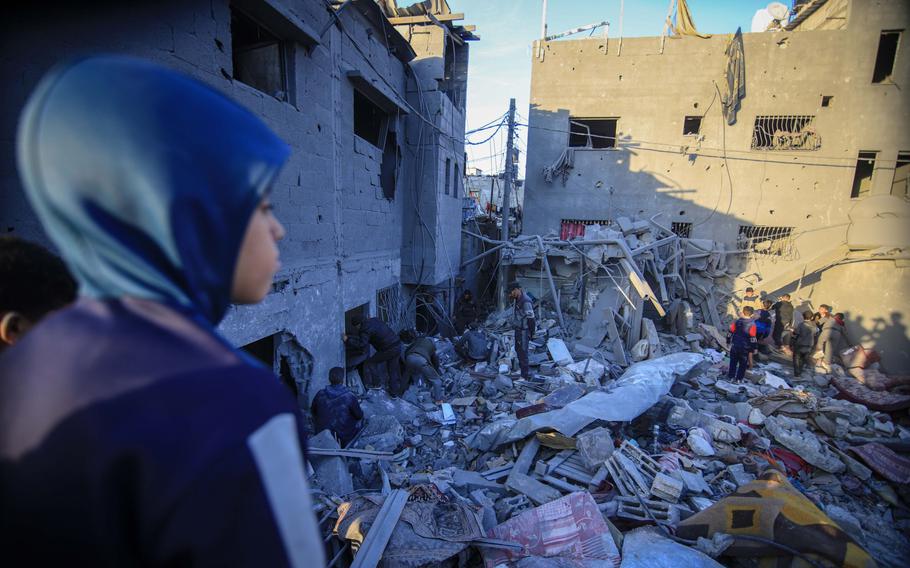Middle East
Israel faces crisis of its own making as chaos and hunger engulf Gaza
The Washington Post March 14, 2024

A U.S. Air Force loadmaster releases humanitarian aid pallets of food over Gaza on March 2, 2024. (U.S. Air Force)
TEL AVIV — For three months, Israeli Prime Minister Benjamin Netanyahu publicly celebrated the fall of Hamas in northern Gaza, brushing aside warnings that severe food scarcity and a widening power vacuum were creating a state of anarchy.
But after a recent aid convoy disaster in Gaza City, and amid reports of Palestinian children dying of malnutrition, Netanyahu faces an international reckoning — under growing pressure from the United States to stave off a famine and restore order to the ravaged enclave. The crisis, current and former officials say, stems from Israel’s failure to develop a workable postwar strategy, or to plan for the consequences of an open-ended military occupation.
Eran Etzion, former deputy chief of Israel’s National Security Council, said the situation in northern Gaza highlights “the depths of the quagmire, the chaos and the inability to simply reinstate any kind of normalcy” after the conclusion of the most intensive stages of combat.
“Preventing famine is Israel’s responsibility legally — doing otherwise would be against the norms Israel is pretending to be upholding — but also strategically, in order to avoid international pressure,” Etzion added.
Pressure kept building Thursday, as Senate Majority Leader Charles E. Schumer (D-N.Y.) warned that Israel risked becoming an international “pariah” if Netanyahu remained in power. The striking speech from the highest-ranking Jewish official in the United States was the clearest sign yet of Washington’s exasperation with the Israeli leader and his handling of the war in Gaza.
Yet the chaos in the north raises larger questions that Israel’s government — torn between a security establishment that is demanding an exit strategy and a coalition whose far-right members hope to occupy the Strip — is not prepared to answer. In an interview with Politico on Sunday, Netanyahu again rejected the idea of handing over power to the Palestinian Authority, seen by Washington as the only viable alternative to Hamas.
When asked about the hunger crisis in northern Gaza, Netanyahu replied: “That’s not the information we have. And we monitor it closely. More importantly, it’s not our policy. Our policies are to put in as much humanitarian aid as we could.”

Israeli Prime Minister Benjamin Netanyahu. (Kobi Wolf/Bloomberg News)
Israel has been working to weaken UNRWA, the U.N. agency for Palestinian refugees, which has the most experience providing aid and other services in Gaza. The United States, among other international donors, withdrew funding from the agency in January after Israel accused more than a dozen of its employees of taking part in the Oct. 7 attacks. UNRWA dismissed the workers allegedly connected to Oct. 7 and is investigating the allegations.
More than 150 UNRWA facilities have been hit in the war, and at least 165 staffers have been killed, the agency says. An Israeli strike on a food distribution site in Rafah on Wednesday killed one employee and injured 22 others. Israel said it was targeting a Hamas commander responsible for diverting aid to the group; Hamas identified the man as the deputy head of police in the area.
National Security Council spokesman John Kirby said Thursday that the Biden administration was “very concerned” about Wednesday’s strike in Rafah and wanted to see Israel conduct “a swift and thorough investigation as to exactly what happened.”
With UNRWA effectively sidelined, the Israeli government is stalling and searching for alternatives, as aid groups and allies warn that time is running out. Many of the 300,000 people remaining in the north skip at least one meal a day and are resorting to eating animal feed and scavenging for wild plants. At least 27 people, mostly children, have died of malnutrition or dehydration in recent weeks, according to the Gaza Health Ministry.
“If we do not exponentially increase the size of aid going into the northern areas, famine is imminent,” Cindy McCain, head of the U.N. World Food Program, said in a statement Monday.
While the United States, Europe and Arab nations are now scrambling to increase assistance through airdrops and a new maritime corridor, the Israeli government “is not working to translate the army’s significant tactical successes into something sustainable,” said Israel Ziv, former head of the Israel Defense Forces’ Operations Directorate.
The scale of the humanitarian crisis came into focus on Feb. 29, when thousands of hungry Gazans rushed a food convoy in the pre-dawn darkness. Israeli forces opened fire and more than 100 people were killed, according to Palestinian health officials. Israeli military spokesman Daniel Hagari said Israeli forces had only fired warning shots and that most of those killed had been trampled in a stampede. Palestinian doctors said the majority of the victims they cared for had bullet wounds. A group of U.N. experts called it a “massacre.”
The sequence of events remained unclear, two senior Biden administration officials told The Washington Post, but they said Israel had created the conditions that led to the tragedy. Three days later, in the administration’s sharpest rebuke of Israel to date, Vice President Kamala Harris called for an “immediate cease-fire” and more aid into Gaza — “no excuses,” she said.
President Joe Biden then announced the construction of a pier off the Gazan coast and the establishment of a maritime corridor for aid, which Israel would be responsible for securing.
“This was chaos of Israel’s own making,” said one of the administration officials, speaking on the condition of anonymity to discuss sensitive conversations. “Ultimately, Israel is responsible for the mass hunger and lack of aid going in.”
Netanyahu has remained defiant. In a speech Tuesday to the pro-Israel AIPAC lobby, he said the international community cannot “support Israel destroying Hamas, then oppose Israel when it takes the actions necessary to achieve that goal.”
He also vowed to press ahead with a military operation in Rafah in the south, where some 1.5 million displaced Gazans have sought refuge. The IDF said Wednesday that civilians would be evacuated to “humanitarian islands” in the center of the territory ahead of an invasion.
Netanyahu’s government was not involved in the pier project, an Israeli official told The Post, speaking on the condition of anonymity because he was not authorized to speak with the press. But he said it welcomed the creation of the maritime aid corridor, which Israel has been lobbying for since the first weeks of the ground invasion.
Humanitarian groups and diplomats say deliveries by air and sea are no substitute for sustained, unhindered land access. An average of 500 trucks a day crossed into Gaza before the war; in five months of conflict, Israeli restrictions have kept the daily average well below the 200 that Israel had promised to facilitate. In mid-February, only a handful of trucks crossed on some days, in part because of Israeli attacks on aid convoys and the police forces — the last vestiges of Hamas rule — who protected them. As security collapsed in the north, aid deliveries all but ceased.
Israel has yet to find a new partner “on the ground in terms of delivering aid in a better way,” the Israeli official said. “Down the road, the goal is for there to be someone … who will now be able to maintain law and order surrounding the provision of [aid] and, further down the road, will bring Gaza onto a different trajectory.”
Who will lead that effort — and how Israel will find them — remains unclear. And the government has set no concrete timeline for accomplishing the war’s main goals: destroying Hamas and returning the more than 100 hostages still held in Gaza.
“As long as there’s no ‘day after’ strategy, it creates a situation in which the IDF is starting to go in circles,” said Gadi Shamni, a former commander of the IDF Gaza division.

Palestinians search the rubble of a destroyed building following an Israeli airstrike in the Nuseirat refugee camp in central Gaza on Feb. 28. (Ahmad Salem/Bloomberg News)
For at least two months, Israel has been partnering with local businessmen to truck in aid to the north. The pilot program, which was mostly kept under the radar until the deadly convoy incident, provides some clues about Israel’s postwar plans.
The initiative originally involved five Gazan business owners, each allotted 20 trucks per day, said one of the businessmen involved in last month’s deadly convoy, speaking on the condition of anonymity to discuss the sensitive situation. The businessman was contacted last month by COGAT, an arm of the Israeli Defense Ministry, and asked if he could deliver food to the north.
Despite fears of looting, the businessman said, he agreed to take the job, hoping the influx of goods would bring down spiraling prices on Gaza’s black market. After the disaster on Feb. 29, he stopped organizing convoys. “Never look for law and order amid starvation,” he said, though he noted that other Palestinian businessmen are still involved in the efforts.
More than 150 aid trucks, mostly from the private sector, entered northern Gaza in the past two weeks, according to COGAT. Under new protocols implemented this month, “at the request of the U.S. government,” the IDF said in a statement, trucks are inspected at Israel’s southern Kerem Shalom border crossing, then accompanied by the IDF for some 30 miles on a road along the security fence. The trucks enter through a new crossing — called “96,” near Kibbutz Beeri — and continue unaccompanied to northern Gaza.
Six WFP trucks passed through the corridor on Tuesday, Hagari told international journalists Wednesday.
“We need to find together, international organizations and other countries, to create an alternative for the north,” he said. “We will flood Gaza with aid.”
But getting trucks into the Strip is only the first in a string of compounding challenges.
“The goal is to have more and more containers, but the question keeps coming up of who will receive these containers, who will secure them, who will sort them, and Israel is again and again finding itself back at square one,” said Michael Milshtein, former head of the Palestinian division of Israeli military intelligence.
The pilot program for aid distribution has drawn new attention to Netanyahu’s hazily defined plan for postwar Gaza, released last month, which called for partnering with “local entities with managerial experience” — widely interpreted as a reference to some of Gaza’s most powerful families, or clans, who once held sway in different parts of the enclave and have clashed with Hamas in the past.
Hamas warned this week that any Palestinians who would work alongside Israel to provide security for aid convoys would be targeted as collaborators.
Israel’s “attempt to communicate with the leaders and clans of some families to operate within the Gaza Strip is considered direct collaboration with the occupation and is a betrayal of the nation that we will not tolerate,” the Hamas-affiliated website al-Majd said, quoting an anonymous military official.
And Hamas is not the only obstacle.
“You cannot find a family that can exert that kind of control,” said an Israeli official familiar with postwar discussions, speaking on the condition of anonymity to discuss the sensitive subject.
Israel has tried to partner with local clans several times — most recently in the 1980s — as alternatives to national movements like Fatah and the Palestinian Authority.
“It’s been tried,” said Ziv, the retired Israeli general, adding that the plan risks “turning Gaza into Somalia, with each of the families fighting each other, getting armed, and Israel won’t step in.”
Without a more feasible long-term strategy, said Milshtein, the former Israeli intelligence official, the Israeli military could find itself occupying Gaza indefinitely — which Washington has said is unacceptable.
“Israel is not working to find a partner with whom to work in Gaza, but instead is starting to make all kinds of arrangements with clans, with Palestinian businessmen … waiting for some sort of magic to happen,” he said. “The idea that any of it could work is an illusion.”
Abutaleb reported from Washington. Heba Farouk Mahfouz in Cairo, Hazem Balousha in Amman, Jordan, and Karen DeYoung in Washington contributed to this report.